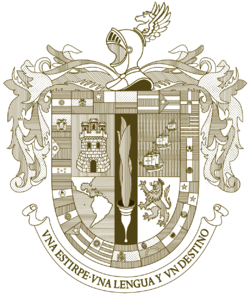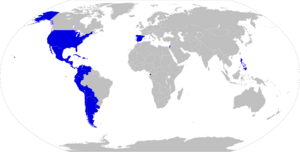Organization:Association of Academies of the Spanish Language
 | |
 Countries where Spanish-language academies exist. | |
| Abbreviation | ASALE |
|---|---|
| Formation | 1951 |
| Headquarters | Madrid, Spain |
Official language | Spanish |
President | Santiago Muñoz Machado[1] |
General Secretary | Francisco Javier Pérez |
Main organ | Permanent commission |
| Website | www |
The Association of Academies of the Spanish Language (Spanish: Asociación de Academias de la Lengua Española; ASALE) is an entity whose end is to work for the unity, integrity, and growth of the Spanish language.[2] It was created in Mexico in 1951 and represents the union of all the separate academies in the Spanish-speaking world. The association publishes reference works on the Spanish language and commemorative editions of Hispanic literature, among other publications.[3][4][5][6]
History
Through the initiative of then-president of Mexico Miguel Alemán Valdés, the first congress of academies convened with the purpose of maintaining the integrity of and fostering the further growth of Spanish.[4] The meeting was held from 23 April to 6 May 1951 and resulted in the creation of the association[7] and its permanent commission.[8] The Royal Spanish Academy (Spanish: Real Academia Española or RAE) was not present at the initial meeting but participated in the permanent commission.[8] Ever since the second congress convened in 1956, the RAE has been a regular participant.[citation needed]
In 2000 the association organised the School of Hispanic Lexicography and the Carolina Foundation to promote Spanish lexicography[citation needed], and together with the RAE, the association earned the Prince of Asturias Award for peace.[7]
An academy for Equatorial Guinea was created in 2013 and joined the association in 2016.[9]
Congresses
| Number | Date | City | Territory | Notes |
|---|---|---|---|---|
| I | 23 April – 6 May 1951 | Mexico City | Mexico | The RAE was not present |
| II | 22 April – 2 May 1956 | Madrid | Spain | |
| III | 27 July – 6 August 1960 | Bogotá | Colombia | |
| IV | 30 November – 10 December 1964 | Buenos Aires | Argentina | The Cuban delegation did not participate |
| V | 24 July – 19 August 1968 | Quito | Ecuador | Delegations from Cuba and Venezuela were not present |
| VI | 20–29 November 1972 | Caracas | Venezuela | |
| VII | 13–23 November 1976 | Santiago de Chile | Chile | Delegations from Cuba and Mexico were not present |
| VIII | 20–27 April 1980 | Lima | Peru | The Cuban delegation did not participate |
| IX | 8–15 October 1989 | San Jose | Costa Rica | Delegations from Cuba, Honduras, and Paraguay were not present |
| X | 24–29 April 1994 | Madrid | Spain | |
| XI | 15–19 November 1998 | Puebla de Zaragoza | Mexico | |
| XII | 12–15 November 2002 | San Juan | Puerto Rico | |
| XIII | 21–24 March 2007 | Medellin | Colombia | |
| XIV | 21–25 November 2011 | Panama City | Panama | |
| XV | 23–25 November 2015 | Mexico City | Mexico | |
| XVI | 27–30 March 2019 | Córdoba | Argentina |
Works
The collaboration between RAE and the other academies was expressed in the coauthorship, since the 22nd edition published in 2001, of the Dictionary of the Spanish Language (Spanish: Diccionario de la Lengua Española), and the 1999 edition of the Orthography (Spanish: Ortografía) was considered a true pan-Hispanic work. Joint projects include the editing of the Grammar (Spanish: Gramática) and the compilation of the Dictionary of Americanisms (Spanish: Diccionario de americanismos).[citation needed]
Organization
The association convenes every four years, led by a Permanent Commission composed of a President (position held by the Director of the Spanish Royal Academy), a Secretary General (one of the directors of the other academies), a Treasurer (chosen by the Spanish Royal Academy), and at least two board members drawn from the associated academies, whose nomination rotate annually.[3][10][11] During the Third Congress of Academies, held in Bogotá, Colombia, in 1960, an agreement was reached whereby the governments of countries with a member in the association would be obliged to provide financial support to their respective academies and the greater association.[12]
Academies
| Country | Name in Spanish | Name in English | Founded |
|---|---|---|---|
| Spain | Real Academia Española | Royal Spanish Academy | 1713 |
| Colombia | Academia Colombiana de la Lengua | Colombian Academy of the Language | 1871 |
| Ecuador | Academia Ecuatoriana de la Lengua | Ecuadorian Academy of the Language | 1874 |
| Mexico | Academia Mexicana de la Lengua | Mexican Academy of the Language | 1875 |
| Salvador El Salvador | Academia Salvadoreña de la Lengua | Salvadoran Academy of the Language | 1876 |
| Venezuela | Academia Venezolana de la Lengua | Venezuelan Academy of the Language | 1883 |
| Chile | Academia Chilena de la Lengua | Chilean Academy of the Language | 1885 |
| Peru | Academia Peruana de la Lengua | Peruvian Academy of the Language | 1887 |
| Guatemala | Academia Guatemalteca de la Lengua | Guatemalan Academy of the Language | 1887 |
| Costa Rica | Academia Costarricense de la Lengua | Costa Rican Academy of the Language | 1923 |
| Philippines | Academia Filipina de la Lengua Española | Philippine Academy of the Spanish Language | 1924 |
| Panama | Academia Panameña de la Lengua | Panamanian Academy of the Language | 1926 |
| Cuba | Academia Cubana de la Lengua | Cuban Academy of the Language | 1926 |
| Paraguay | Academia Paraguaya de la Lengua Española | Paraguayan Academy of the Spanish Language | 1927 |
| Bolivia | Academia Boliviana de la Lengua | Bolivian Academy of the Language | 1927 |
| Dominican Republic | Academia Dominicana de la Lengua | Dominican Academy of the Language | 1927 |
| Nicaragua | Academia Nicaragüense de la Lengua | Nicaraguan Academy of the Language | 1928 |
| Argentina | Academia Argentina de Letras | Argentine Academy of Letters | 1931 |
| Uruguay | Academia Nacional de Letras | National Academy of Letters | 1943 |
| Honduras | Academia Hondureña de la Lengua | Honduran Academy of the Language | 1949 |
| Puerto Rico | Academia Puertorriqueña de la Lengua Española | Puerto Rican Academy of the Spanish Language | 1955 |
| United States | Academia Norteamericana de la Lengua Española | North American Academy of the Spanish Language | 1973 |
| Equatorial Guinea | Academia Ecuatoguineana de la Lengua Española | Equatoguinean Academy of the Spanish Language | 2013 |
| Israel | Academia Nacional del Judeoespañol en Israel | National Academy of Judaeo-Spanish in Israel | 2020 |
Although Israelis mainly speak Hebrew, Arabic, English, and Russian, an ASALE conference on Judaeo-Spanish held in 2015[13] led to plans for the creation of an Israeli branch.[14] A group of academics was founded by ASALE in 2018 and submitted to the government of Israel for recognition. The National Academia of Judaeo-Spanish in Israel will then have the ability to petition to join as a full member, likely in 2019.[15][needs update] There are no plans for Belize, Gibraltar, or Andorra to have their own academies, despite each having a majority Spanish-speaking population either as a first or second language. There is also a substantial Spanish population in Brazil and Western Sahara.[citation needed]
See also
- Autoridad Nasionala del Ladino – a defunct Israeli body that regulated Ladino
- Cervantes Institute – a Spanish cultural institution
- Panhispanism – promotion of unity among Spanish speakers
- List of language regulators
References
- ↑ Mantilla, Jesús Ruiz (4 April 2019). "Pedro Sánchez asegura ante los académicos el apoyo del Gobierno a la RAE" (in es). El País. https://elpais.com/cultura/2019/04/04/actualidad/1554395832_537031.html.
- ↑ "Estatutos y reglamento de la Asociación de Academias de la Lengua Española". 2007. http://www.asale.org/sites/default/files/Estatutos_ASALE_2007.pdf.
- ↑ 3.0 3.1 "Estatutos y organización". http://www.asale.org/la-asociacion/presentacion/estatutos-y-organizacion.
- ↑ 4.0 4.1 "I Congreso (México, 1951)". http://www.asale.org/la-asociacion/actividad-institucional/i-congreso-mexico-1951.
- ↑ "Obras y proyectos". http://www.asale.org/obras-y-proyectos.
- ↑ "Publicaciones". http://www.asale.org/publicaciones.
- ↑ 7.0 7.1 "Siglo XX". http://www.asale.org/la-asociacion/politica-panhispanica/siglo-xx.
- ↑ 8.0 8.1 "Historia". http://www.asale.org/la-asociacion/politica-linguistica-panhispanica/hechos-relevantes.
- ↑ "Aprobada la incorporación de la Academia Ecuatoguineana a la ASALE". 19 March 2017. http://www.asale.org/noticias/aprobada-la-incorporacion-de-la-academia-ecuatoguineana-la-asale-0.
- ↑ Villanueva, Darío (30 November 2015). "Bienvenida del presidente". http://www.asale.org/la-asociacion/bienvenida/bienvenida-del-presidente.
- ↑ Pérez, Francisco (28 January 2016). "Saludo del secretario general". http://www.asale.org/la-asociacion/bienvenida/saludo-del-secretario-general.
- ↑ "Convenio multilateral Asociación de Academias de la Lengua Española". 1960. http://www.asale.org/sites/default/files/Convenio_Bogota.pdf.
- ↑ "La RAE elige a ocho académicos correspondientes judeoespañoles". Nov 12, 2015. http://www.rae.es/noticias/la-rae-elige-ocho-academicos-correspondientes-judeoespanoles.
- ↑ Sam Jones (1 August 2017). "Spain honours Ladino language of Jewish exiles". https://www.theguardian.com/world/2017/aug/01/spain-honours-ladino-language-of-jewish-exiles.
- ↑ "Se acuerda la creación de la Academia Nacional del Judeoespañol en Israel" (in es). Association of Academies of the Spanish Language. February 20, 2018. http://www.asale.org/noticias/se-acuerda-la-creacion-de-la-academia-nacional-del-judeoespanol-en-israel.
External links
 |


